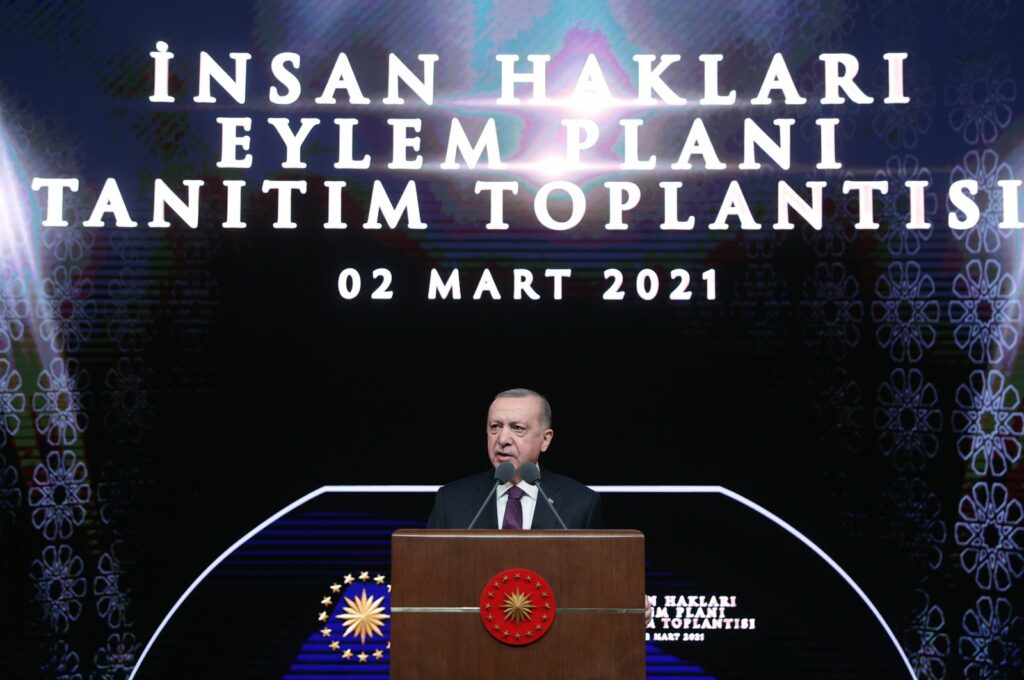The Turkish government has failed to carry out most of the actions in the new human rights action plan that was announced by President Recep Tayyip Erdoğan in March, the Stockholm Center for Freedom reported, citing Deutsche Welle Turkish (DW) service.
The government aimed to complete 130 actions in the first six months of the plan, whereas only 36 were actually implemented. Moreover, only 16 of the 40 actions meant to be carried out in the first three months were realized.
President Erdoğan had introduced the plan saying it was based on 11 principles, nine aims and 50 goals and consisted of 393 actions that would be implemented over a two-year period.
“The final goal of our action plan is a new and civilian constitution,” Erdoğan said, repeating his Justice and Development Party’s (AKP) plans to press ahead with a new charter for Turkey.
One of the highlighted actions in the plan was allowing all imprisoned minors contact visitation and extra time with their families. According to the action plan, children younger than 6 years old staying with their mothers in prison were to be handed over to their relatives’ care during contact visitation.
Another important change was the provision of assistance to disabled prisoners getting to and from visitations. Yet, these actions were not brought into effect.
According to Mustafa Yeneroğlu, a deputy from the opposition DEVA Party, the government’s failure to reach important milestones indicated a failure of the action plan.
“The government has made a habit of not keeping its promises,” he said. “Unfortunately, the human rights action plan is one of these promises.”
Yeneroğlu pointed out that arbitrary arrests were still common in Turkey and the judiciary was far from being independent as it was under government pressure.
Öztürk Türkdoğan from the Human Rights Association (İHD) said despite promising the improvement of human rights, Turkish authorities had done the opposite. “The maximum period of detention was extended to 12 days [as of July 31], and governors can easily ban public demonstrations,” said Türkdoğan.
He said prisoner rights had deteriorated during the COVID-19 pandemic and that authorities were using COVID-19 measures as a pretext to prevent prisoners from seeing their loved ones. “Vaccination rollouts in prisons should have been completed already,” he said. “This includes vaccination of guards and administrators.”
Although restrictions for such large gatherings as weddings and concerts have been lifted and inmates have been vaccinated, the families can only see their loved ones behind glass panels during non-contact visits.
The principles in the human rights action plan place individual rights and freedoms as well as human dignity under state protection. According to these principles, everyone is equal before the law no matter their religion, language, ethnicity, gender, political views or beliefs; public services should be offered to all in an objective and fair manner; public authorities are obliged to obey the law; the state protects the right to work and free enterprise; the presumption of innocence must dominate all judicial proceedings; nobody can be deprived of their freedoms due to their criticism of others; rights and freedoms are exercised in all areas as a guarantee of a state of law; and everyone who has been subjected to rights violations can easily access judicial mechanisms to seek justice.
Erdoğan’s human rights action plan received little appreciation, apparently because thousands of people including intellectuals, politicians and journalists are behind bars despite rulings from the European Court of Human Rights for their immediate release, such as Kurdish politician Selahattin Demirtaş and businessman Osman Kavala.
Following a failed coup attempt in Turkey in July 2016, Erdoğan launched a massive crackdown on non-loyalist citizens under the pretext of an anti-coup fight, which led to the prosecution of thousands of people on trumped-up terrorism or coup charges.

